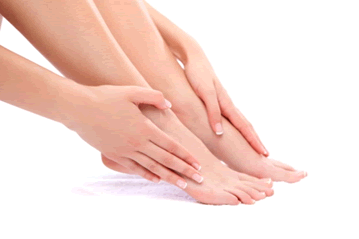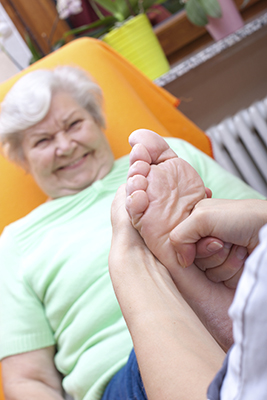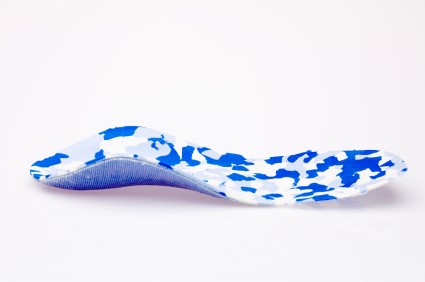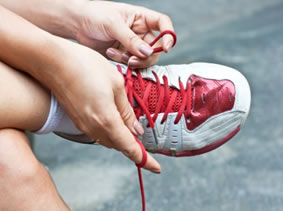Items filtered by date: December 2016
About Plantar Fasciitis
 Plantar fasciitis is a foot condition that most commonly affects those between the ages of 30 to 55, especially those who are athletes. The plantar fascia, a ligament that runs beneath the sole of the foot, supports the arch of the foot and acts as a shock absorber. Repeated stress and impact to the heel, however, can cause the fascia to tear and cause inflammation. This results in the foot condition, plantar fasciitis. While there are various specific causes behind plantar fasciitis, excessive pressure is often the case. To determine the cause of your plantar fasciitis and the most appropriate treatment, consult with your podiatrist.
Plantar fasciitis is a foot condition that most commonly affects those between the ages of 30 to 55, especially those who are athletes. The plantar fascia, a ligament that runs beneath the sole of the foot, supports the arch of the foot and acts as a shock absorber. Repeated stress and impact to the heel, however, can cause the fascia to tear and cause inflammation. This results in the foot condition, plantar fasciitis. While there are various specific causes behind plantar fasciitis, excessive pressure is often the case. To determine the cause of your plantar fasciitis and the most appropriate treatment, consult with your podiatrist.
Plantar fasciitis can be very painful and inconvenient. If you are experiencing heel pain or symptoms of plantar fasciitis, contact Dr. Joshua David Scoll of Pennsylvania. Our doctor can provide the care you need to keep your pain free and on your feet.
What is Plantar Fasciitis?
Plantar fasciitis is the inflammation of the thick band of tissue that runs along the bottom of your foot, known as the plantar fascia, and causes mild to severe heel pain.
What Causes Plantar Fasciitis?
· Excessive running
· Non-supportive shoes
· Overpronation
· Repeated stretching and tearing of the plantar fascia
How Can It Be Treated?
· Conservative measures – anti-inflammatories, ice packs, stretching exercises, physical therapy, orthotic devices
· Shockwave therapy – sound waves are sent to the affected area to facilitate healing and are usually used for chronic cases of plantar fasciitis
· Surgery – usually only used as a last resort when all else fails. The plantar fascia can be surgically detached from the heel
While very treatable, plantar fasciitis is definitely not something that should be ignored. Especially in severe cases, speaking to your doctor right away is highly recommended to avoid complications and severe heel pain. Your podiatrist can work with you to provide the appropriate treatment options tailored to your condition.
If you have any questions please feel free to contact our office located in Philadelphia and Bensalem, PA. We offer the newest diagnostic and treatment technologies for all your foot and ankle needs.
Diabetic Feet in Cold Weather
 Taking preventative measures as a diabetic patient during the cold weather months is vital toward ensuring your general health. Feet are especially prone to infections and complications during colder weather due to poor blood circulation. The American College of Foot and Ankle Surgeons recommends the following tips. Work toward always keeping your feet dry by ensuring that moisture does not collect in your feet. Change your socks as often as needed. Moisturize your feet to prevent them from itching, cracking and dryness. Avoid moisturizing in between the toes as that can encourage fungal infections. Avoid overheating your feet, especially if taking hot baths. Wear properly fitting footwear and make sure to see your doctor periodically for regular foot exams.
Taking preventative measures as a diabetic patient during the cold weather months is vital toward ensuring your general health. Feet are especially prone to infections and complications during colder weather due to poor blood circulation. The American College of Foot and Ankle Surgeons recommends the following tips. Work toward always keeping your feet dry by ensuring that moisture does not collect in your feet. Change your socks as often as needed. Moisturize your feet to prevent them from itching, cracking and dryness. Avoid moisturizing in between the toes as that can encourage fungal infections. Avoid overheating your feet, especially if taking hot baths. Wear properly fitting footwear and make sure to see your doctor periodically for regular foot exams.
Diabetic foot care is important in preventing foot ailments such as ulcers. If you are suffering from diabetes or have any other concerns about your feet, contact Dr. Joshua David Scoll of Pennsylvania. Our doctor can provide the care you need to keep you pain-free and on your feet.
Diabetic Foot Care
Diabetes affects millions of people every year. Diabetes can damage blood vessels in many parts of the body, including the feet. Because of this, taking care of your feet is essential if you have diabetes, and having a podiatrist help monitor your foot health is highly recommended.
The Importance of Caring for Your Feet
- Routinely inspect your feet for bruises or sores.
- Wear socks that fit your feet comfortably.
- Wear comfortable shoes that provide adequate support.
Patients with diabetes should have their doctor monitor their blood levels because blood sugar levels play such a huge role in diabetic care. Monitoring these levels on a regular basis is highly advised.
It is always best to inform your healthcare professional of any concerns you may have regarding your feet, especially for diabetic patients. Early treatment and routine foot examinations are keys to maintaining proper health, especially because severe complications can arise if proper treatment is not applied.
If you have any questions please feel free to contact our offices located in Philadelphia and Bensalem, PA. We offer the newest diagnostic and treatment technologies for all your foot and ankle needs.
Custom Orthotics Better than Over-the-Counter Inserts
 Orthotics are different from shoe inserts in that they are designed specifically for your feet, meant to treat you specific foot condition. At least “58 percent of Americans have said they have had heel pain due to ill-fitting shoes,” according to the American Podiatric Medical Association, and many resort to using over-the-counter shoe inserts to aid in fighting foot pain. However, even though shoe inserts can offer comfort and support, they are not customized to address the individual’s specific foot problems. Orthotics are crafted from an individual’s foot imprints and can be used to treat a multitude of problems including plantar fasciitis, heel spurs, tendon problems, arthritis, flat feet and more.
Orthotics are different from shoe inserts in that they are designed specifically for your feet, meant to treat you specific foot condition. At least “58 percent of Americans have said they have had heel pain due to ill-fitting shoes,” according to the American Podiatric Medical Association, and many resort to using over-the-counter shoe inserts to aid in fighting foot pain. However, even though shoe inserts can offer comfort and support, they are not customized to address the individual’s specific foot problems. Orthotics are crafted from an individual’s foot imprints and can be used to treat a multitude of problems including plantar fasciitis, heel spurs, tendon problems, arthritis, flat feet and more.
If you are having discomfort in your feet and would like to try orthotics, contact Dr. Joshua David Scoll of Pennsylvania. Our doctor can provide the care you need to keep you pain-free and on your feet.
What are Orthotics?
Orthotics are inserts you can place into your shoes to help with a variety of foot problems such as flat feet or foot pain. Orthotics provide relief and comfort for minor foot and heel pain, but can’t correct serious biomechanical problems in your feet.
Over-the-Counter Inserts
Orthotics come in a wide variety of over-the-counter inserts that are used to treat foot pain, heel pain, and minor problems. For example, arch supports can be inserted into your shoes to help correct over arched or flat feet, while gel insoles are often used because they provide comfort and relief from foot and heel pain by alleviating pressure.
Prescription Orthotics
If over-the-counter inserts don’t work for you, or if you have a more severe foot issue, it is possible to have your podiatrist prescribe custom orthotics. These high quality inserts are designed to treat problems such as abnormal motion, plantar fasciitis, and more severe heel pain. They can even be used to help patients suffering from diabetes by treating foot ulcers and painful calluses, and are usually molded to your feet individually, which allows them to provide full support and comfort.
If you are experiencing minor to severe foot or heel pain, it’s recommended to speak with your podiatrist on the possibilities of using orthotics. A podiatrist can determine which type of orthotic is right for you and allow you to take the first steps towards being pain free.
If you have any questions please feel free to contact our offices located in Philadelphia and Bensalem, PA. We offer the newest diagnostic and treatment technologies for all your foot and ankle needs.
How to Shop for Shoes
 For individuals who are looking for properly-fitting and comfortable shoes such as dress shoes or boots, look for those that offer adequate arch support as well as enough room in the toe box of the shoes for our toes to wiggle, according to Dr. Bob Weil, sports podiatrist. Heels of shoes should also be no higher than an inch and a half. Also take into consideration the length and width of our feet, especially when getting them measured. Shoes should offer good support, mostly for the arch area.
For individuals who are looking for properly-fitting and comfortable shoes such as dress shoes or boots, look for those that offer adequate arch support as well as enough room in the toe box of the shoes for our toes to wiggle, according to Dr. Bob Weil, sports podiatrist. Heels of shoes should also be no higher than an inch and a half. Also take into consideration the length and width of our feet, especially when getting them measured. Shoes should offer good support, mostly for the arch area.
Finding a properly-fitting shoe is important in reducing injuries and preventing foot problems. For more information about treatment, contact Dr. Joshua David Scoll of Pennsylvania. Our doctor can provide the care you need to keep your pain free and on your feet.
Proper Shoe Fitting
A common concern when it comes to foot health, having properly fitted shoes can help prevent injuries to the foot. Out feet affect our posture and gait, which in turn affects the biomechanics and overall bodily structure. With 33 joints, 26 bones, and over 100 ligaments, the potential for serious injury is much greater than one realizes. Although the feet cease growth in adulthood, they still change shape as they mature. Here are some factors to consider when it comes to investing in proper fitting shoes:
- Be sure the shoes fit correctly right away
- Ensure the ball of your foot fits comfortably in the widest portion of the shoes
- Even though they may look fashionable, improper fitting shoes can either create adverse conditions or exacerbate existing ones you may already have
- Walk along a carpeted surface to ensure the shoes comfortably fit during normal activity
Keeping in mind how shoes fit the biomechanics of your body, properly-fitting shoes are vitally important. Fortunately, it is not difficult to acquire footwear that fits correctly. Be sure to wear shoes that support the overall structure of your body. Do your feet a favor and invest in several pairs of well-fitted shoes today.
If you have any questions please feel free to contact our office located in Philadelphia and Bensalem, PA. We offer the newest diagnostic tools and technology to treat your foot and ankle needs.
